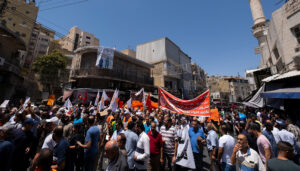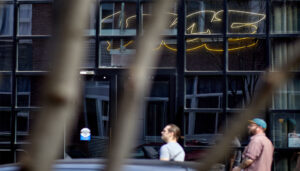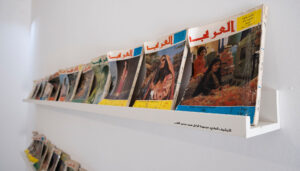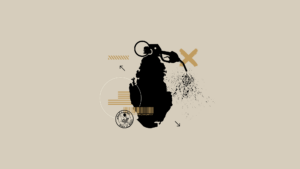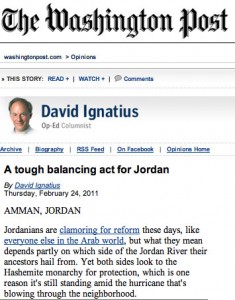 This letter was sent to columnist David Ignatius on March 4, 2011, in response to an article he published in the Washington Post on February 24, titled: A tough Balancing Act for Jordan. You can read the full article here.
This letter was sent to columnist David Ignatius on March 4, 2011, in response to an article he published in the Washington Post on February 24, titled: A tough Balancing Act for Jordan. You can read the full article here.
Dear Mr. Ignatius,
Having read your interesting article in The Washington Post (February 24, 2011), we would like to clarify the following points:-
1. We are truly saddened by your statement that “[a]round the royal palace , people speak of “Meds” and “Beds”- referring to the worldly Mediterranean outlook of the Palestinians and the traditional values of the Bedouin tribes of the East bank”. If this is the issue, it is horrific as the impression one gets from reading your article is that it is the civilized Meds versus the uncivilized Beds. In this aspect we would like to draw your attention to the fact that the majority of the Arab population in this part of the world is divided into three categories: bedouins, villagers and city dwellers. This classification is also valid in both Jordan and Palestine. One always finds people from all three categories living in large cities like Amman, the capital city of Jordan. The Majority of Bedouins are no longer living in the desert; they are educated and are living and working in the capital and other cities as professionals, teachers, army officers, etc. This is also applicable, even to a larger extent, to villagers.
2. Your attempt to distinguish between East Bankers and Jordanians of Palestinian origin based on how they see reform is also deceiving or, to say the least, misinformed. While they may be less vocal than East Bankers, many Jordanians of Palestinian origin do also equate privatization with corruption and want more freedoms. The reason many Jordanians of Palestinian origin are staying quiet these days is attributed to the Government’s practice in recent years of depriving some of them of their citizenship without any sound legal basis. East Bankers are more vocal about these issues because of the threat to their livelihoods and to their right to a dignified life. Your article is not doing justice to Jordanians, especially East Bankers. Throughout Jordan’s history, its citizens have been demanding reforms. What we have witnessed in the past few years is a resurgence of national reform movements claiming rights of political, social and economic nature. An example of said movements are seen in the call for the implementation of the 1952 constitution as it existed and abolishing all amendments which resulted in shifting more power to the executive branch. This demand is shared by the “Jayeen” movement, whose spokesman Ali Suneid (a Bed) also led the protests of the daily labourers. Another example is the demand for establishing a teachers’ union led by the teachers themselves, which is led by Beds such as Adma Zurikat and Mustafa Rawashdeh. On the other hand, the campaign (Dabahtona) which aims at upholding the rights of university students is demanding more freedoms and the intervention of the State to protect students from astronomical education fees. The spokesperson for this movement is Dr Faker Da’as (a Med).
All reform movements whether led by Beds or Meds have common demands while sharing an allegiance to the Hashemite regime: the implementation of the 1952 constitution, the institution of more civil liberties, the establishment of a teachers’ union, the uprooting of corruption, the assessment of privatization of national entities, and the enactment of a new elections law which abolishes the one-man one-vote rule.
3. You also allude to criticism of the Queen by the “old guard”. You mention that the perception of the Queen being a partner is unacceptable to the Bedouins. This point of view is based on the fact that the Jordanian constitution makes no mention of the Queen and does not give her any role in governing. To draw parallels with the British monarchy, Jordan’s Queen is similar to the Queen Consort in Great Britain (i.e., she is the wife of the reigning monarch and has no constitutional status or power, but merely carries the title). It is the monarch’s discretion to issue a royal decree bestowing the title “Queen” to his wife.
Jordan has always been a shining example of co-existence for different religions and ethnicity. Inaccurate analyses that play on national sentiments lead to misunderstandings which result in internal conflict. The end result of such analyses will enhance the argument that Jordan is the alternative homeland for Palestinians and burying forever the two states’ solution.
Proudly yours (two of the so called Jordanian “Beds”),
Reem Abu Hassan and Arimal Al–Hawamdeh






